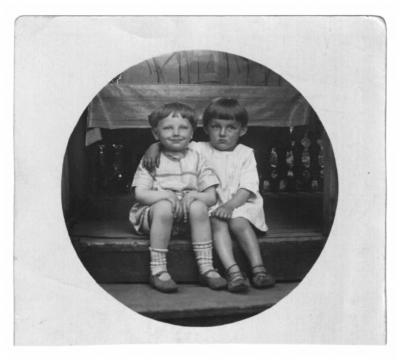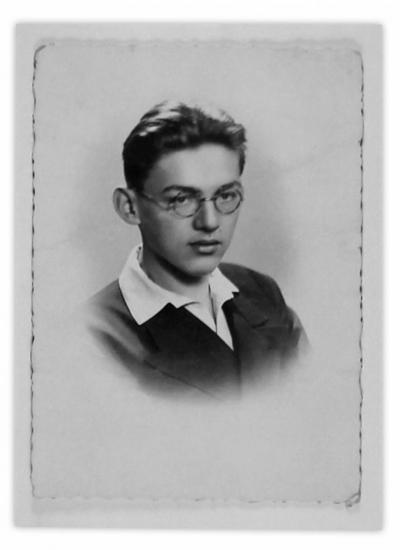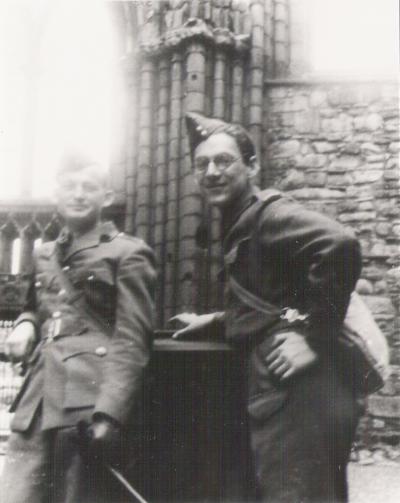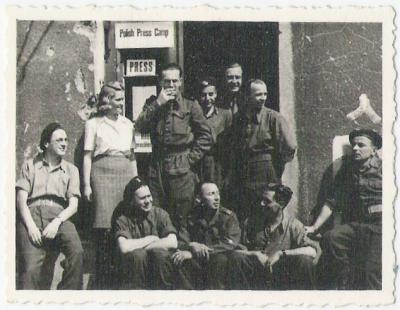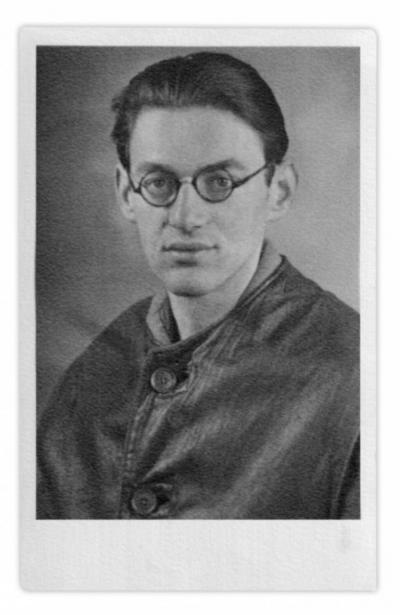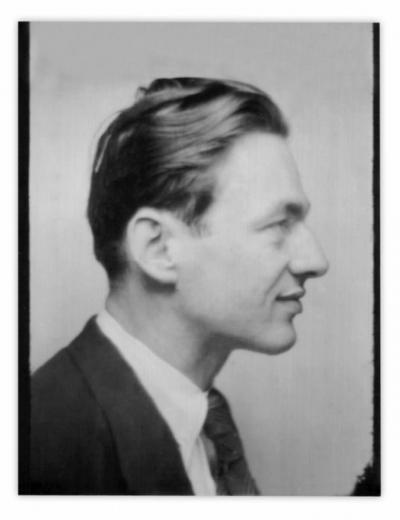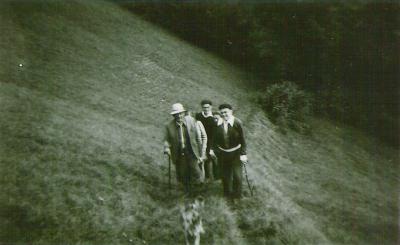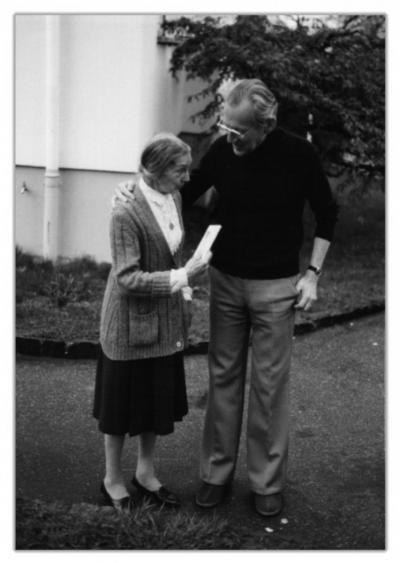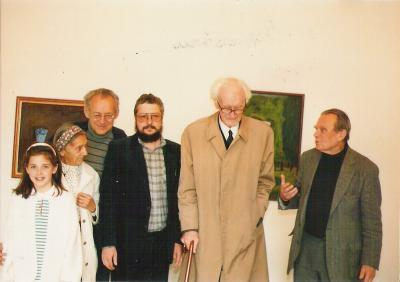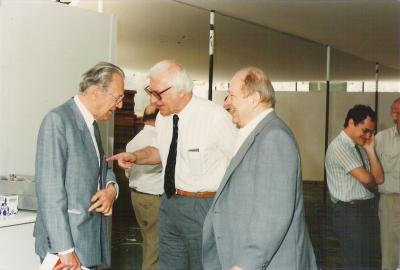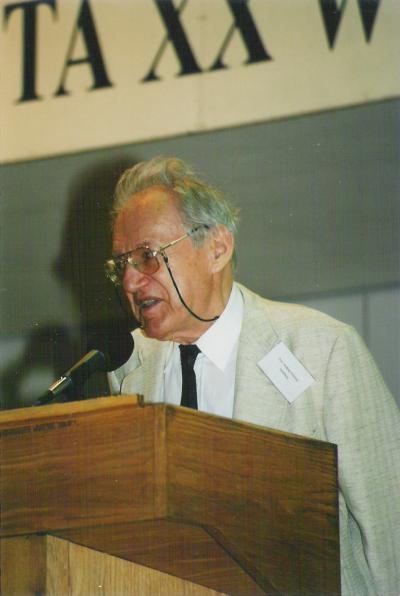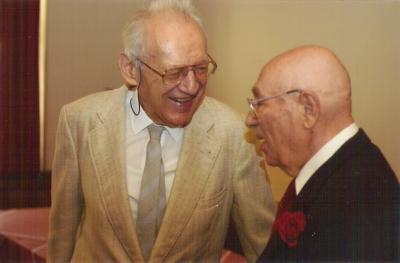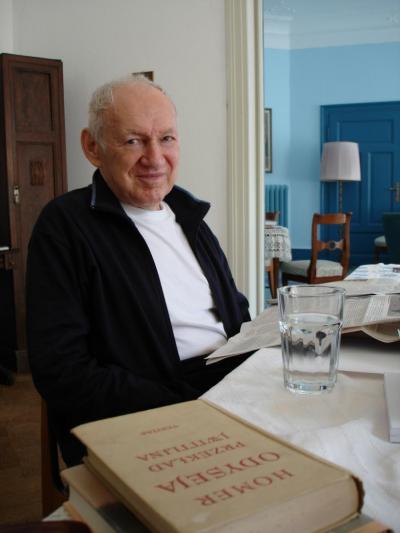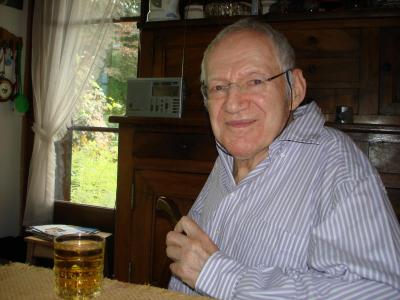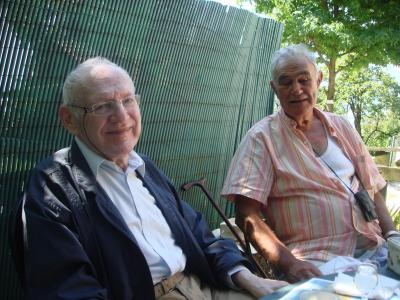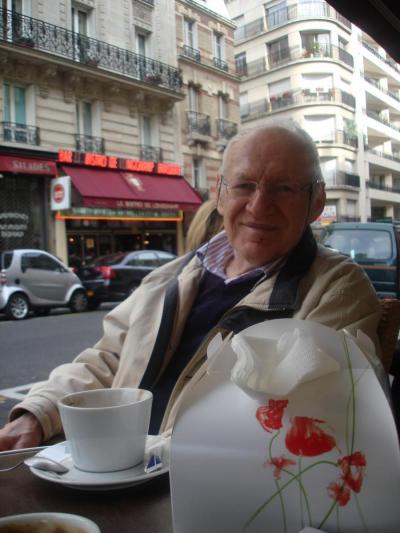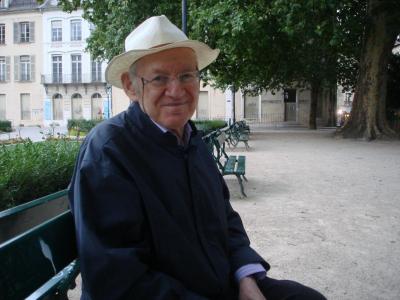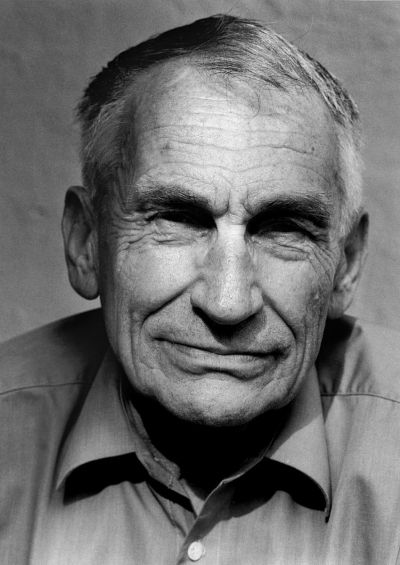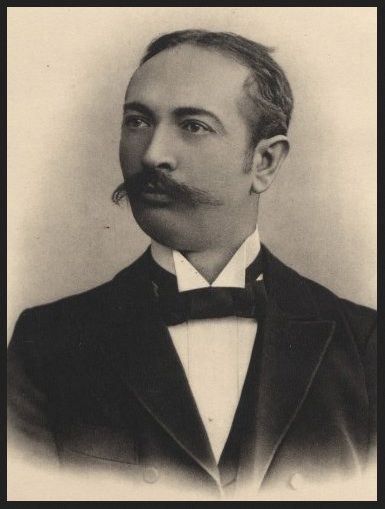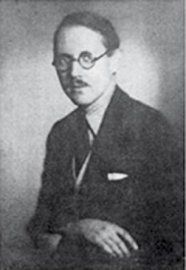Andrzej Vincenz

Andrzej Vincenz was born in Lemberg on 13 March 1922. He was the first child of Irena Vincenz, née Eisenmann (1900–1991), and the author and philosopher Stanisław Vincenz (1888–1971). His mother came from Warsaw. Spurred on by patriotic allegiance, she entered a military women’s group in 1920 which is how she ended up in Lemberg. In Lemberg, she met her husband Stanisław Vincenz who worked on the armed forces staff there. Irena’s marriage to Vincenz, who was later to become a writer and author of “On the high uplands” (Na wysokiej połoninie), was his second. As well as his sister Barbara who was born in 1924, Andrzej had an older half-brother, Stanisław Aleksander (1915–2003), from his father’s marriage to Helena Loeventon (?–1952). The Vincenz family were landowners and oil industrialists from the Hutsul Republic, more precisely from the region around the town of Kolomyia. The profits from the oil mine in Słoboda Rangurska were the family’s main source of income. The family name can be traced back to Charles-Francois de Vincens who left revolutionary France to seek protection in Vienna. It was there that he met Miss Przybyłowska from Kryvorivnya (Kryworiwnja) – one of Andrzej’s great-grandmothers. After the death of her husband, she returned to the Hutsul Republic with her children. 150 years later, an historic event was to lead to her descendants – Stanisław Vincenz and his family, including his son Andrzej – to return to France after the Second World War, from where Andrzej Vincenz later moved to Germany.
After Andrzej was born, the young family moved to Milanówek near Warsaw. His father worked as a ministerial official before becoming chair of the Polmin oil company. They then moved to Warsaw where the family lived in Ujazdowskie Allee. Whilst in Milanówek, Andrzej’s mother had got to know Walentina Białostocka, who was from Russia. Her son Jan (1921–1988) became Andrzej’s closest friend. The connection that developed between the two was almost like family; they supported each other in their development, helped each other in the search for books and later were godparents to each other’s children. During their time at grammar school, the pair was joined by the son of a Ukrainian, Ihor Ševčenko (1922–2009). All three were to go on to be outstanding professors. Ihor Ševčenko would later teach Byzantine Studies at Harvard and become an eminent authority on this subject. Jan Białostocki would later become one of the most famous Polish art historians of the 20th century. In Germany, Andrzej Vincenz became a Professor of Slavic Studies, a publicist and a devoted keeper of his father’s work.
At the end of the 1920s, the Vincenz family left Warsaw and returned to the Hutsul Republic. They initially rented a house in Żabie, which today is known as Vorokhta. Following a fire, Stanisław and Irena Vincenz built their own house in Bystrzec. Their Hutsul nanny Waselina looked after the children and it is from her that Andrzej learnt the local dialect. His childhood is steeped in the cultural and linguistic diversity of Galicia. The Vincenz family kept an open house where countless guests from Poland and abroad stayed in summer. The father Stanisław Vincenz was fascinated by the culture and traditions of their Hutsul neighbours and it goes without saying that his children inherited his passion for them. In the first few years, Irena Vincenz taught her children at home. Andrzej Vincenz was only sent to a state school at grammar school level once he had passed the relevant examination. Years later he would recount that his parents had not told him that it would be an exam so that he would not be put under any stress. That is why he handled the meeting with the examiner as he would any other. Andrzej was accepted into the Stefan Batory Grammar School in Warsaw. During the school year he lived in Bagatela Street with Rozalia Eisenmann, his grandmother on his mother’s side. He spent the school holidays with his parents in Bystrzec. It was during his schooldays that Andrzej Vincenz’s passion for writing emerged. He wrote for the magazine “Ignis”, which was published at the Mickiewicz Grammar School which his friends Jan Białostocki and Ihor Ševčenko attended. Both of them also worked as editors at the magazine. The young Andrzej was fascinated by Latin. Even at that time, his interest in linguistics was beginning to emerge.
The outbreak of war on 1 September 1939 affected the whole family in Bystrzec. Stanisław Vincenz travelled with his eldest son Stasiek to Hungary to arrange the trip to the safe side of the Carpathian Mountains for the rest of the family. They were supported in this by Jerzy Stempowski (1893–1969). After returning from Hungary, where they had again been exploring the area, they were arrested by the NKWD (People's Commissariat for Internal Affairs of the USSR). After their release, thanks to the advocacy of Ukrainian authors, the situation continued to be dangerous, particularly for the sons. They hatched a plan to flee to Hungary. On 19 March 1940, just before Easter, Andrzej Vincenz and his brother struggled through to the Hungarian side in dramatic circumstances. Once there, Andrzej Vincenz took himself off to the Polish Embassy from where he was sent to the Polish army, which had now deployed to France. On 17 April 1940, he joined the Polish army in Bressuire. After the surrender of France in June 1940, he was evacuated to Great Britain, ultimately ending up in Stirling in Scotland. Andrzej Vincenz became a team-ranking soldier in General Maczek’s 1st armoured division and was trained as a radio operator. Alongside the preparations for the landing, he continued his education and attended a course to complete the school-leaving exam. At his explicit request, his subjects included ancient Greek. Thanks to the mediation of Jerzy Stempowski, who was staying in Switzerland, he was able to correspond with his parents who succeeded in making their way to Hungary two months after him in May 1949. In 1942, Andrzej Vincenz passed his school-leaving exam as a day pupil at the Polish grammar school in Scotland.
On 22 July 1944, Andrzej Vincenz landed in Normandy as a soldier in the 1st armoured division under General Maczek. He was responsible for telecommunications and travelled around in an all-terrain vehicle. He was involved in the liberation of France, Belgium, the Netherlands and Germany. Towards the end of the war, he joined the editorial team at “Dziennik Żołnierza” (soldiers’ newspaper), where he met came across his schoolfriend Konstanty Jeleński. After hostilities ended, he remained in Germany for two years as the editor of the “Dziennik Żołnierza”. He was stationed in Quackenbrück near Münster. In 1946, Andrzej Vincenz managed to bring his parents and his sister Barbara from Hungary via Austria to his unit in Quackenbrück. Konstanty Jeleński helped with the secret border crossing. Andrzej Vincenz was demobilised on 10 July 1947 in Calais, France – he was one of the last soldiers to be demobilised because he had not learnt a profession. At this point, his parents were already in France. His sister had received a scholarship to study physics at the University of Grenoble, whilst Stanisław and Irena Vincenz settled nearby in the small French town of Uriage les Bains.
In autumn 1947, Andrzej Vincenz commenced his studies in English, Romance languages and linguistics at the Sorbonne in Paris. He got to know Polish students and scholarship recipients, including Alina Szapocznikow, Joanna Guze and his first wife, the psychology student Alina Guzik, who had survived the Warsaw Ghetto during the war. As a result of the friendship that he developed with Józef Czapski, he got to know Jerzy Giedroyc and the other members of the editorial team at the magazine “Kultura”. Andrzej shared a deep friendship with Konstanty Jeleński, who moved to Paris from Rome at the beginning of the 1950s. At the request of Jerzy Giedroyc, he published articles in the “Kultura” which, as time went by, more often featured subjects linked to the Ukraine. In the first few years, he published articles in the “Kultura” under the pseudonym Jan Torosiewicz.
He became the editor of the radio programme “Język francuski dla Polski” (A French voice for Poland), which was transmitted through Radio France International. He considered this to be a voluntary activity, but after a few years one of his colleagues successfully appealed for his work to be remunerated. For Andrzej Vincenz, these outstanding payments constituted a starting capital that allowed him to purchase a summer house in the alpine village of La Combe des Lancey near Grenoble – the purchase being made with his parents in mind. In the future, they would be visited by Czesław Milosz, Józef Czapski and Jeanne Hersch at this house.
Andrzej Vincenz’s master’s thesis dealt with the Old Provençal dialect. The material for this work came from linguistic research which he carried out in La Combe de Lancey and its surrounds. Later, in his post-doctoral thesis, he would examine Hutsul first names (Traite d'anthroponymie houtzoule. Forum Slavicum 18, Munich 1970). At the end of the 1950s, Andrzej Vincenz contacted Prof. Dmitrij Tschižewskij (1894–1977), the founder of Slavic Studies in post-war Germany, who taught at the University in Heidelberg. In 1960, Andrzej moved from Paris to Heidelberg as a lecturer in the Polish language.
His second wife, the Swiss-born Sylvia Solari (1938–1994), followed him shortly afterwards. Andrzej Vincenz became a father. The couple had a daughter Anna (born in 1961) and a son Stanisław (born in 1963). In the 1960s, there was a significant rise in interest in Polish literature and culture in Germany. At that time, the poet and translator of “Pan Tadeusz”, Hermann Buddensieg (1893–1976), was working in Heidelberg where he published the extensive periodical “Mickiewicz-Blätter” three times a year. Andrzej Vincenz arranged the contact between Buddensieg and Stanisław Vincenz. He also had close contact to Karl Dedecius (1921–2016), a translator of Polish literature who lived in Frankfurt. His support was also instrumental in establishing contact with the group involved in the “Kultura” in Paris. Andrzej Vincenz became a link between this part of Germany and the milieu of Polish intellectuals in Paris. He often commuted between Heidelberg and Paris, and spent the summer months in the area around Grenoble.
After his post-doctorate degree at the Sorbonne in 1966, in 1967 he became a professor at the university in Heidelberg. In 1973, he moved to the university in Göttingen as a linguist and professor of Slavic Studies. From 1967, he was a member of the Scientific Society in Exile.
Andrzej Vincenz was without doubt a polyglot. He spoke fluent German, French, English, Ukrainian, Italian, Romanian and Russian. He could also get by in Czech, Serbo-Croat and even Albanian. His Latin was perfect and his knowledge of ancient Greek was sound. He also knew Old Church Slavic, thanks to a six-month stay in a Greek Catholic monastery in Wales at the end of the 1950s (where he was employed as the prior’s secretary). He was also familiar with the Hutsul dialect. In the last years of his life, he began to teach himself Spanish.
During his time as a professor of linguistics at the Chair of Slavic Studies at Göttingen University, he increasingly turned to the fields of etymology and onomastics. He initiated an interdisciplinary working group on the elements in the Polish language that are borrowed from German. With the publication of their findings by his successor Prof. Gerd Hentschel, the project was celebrated as an Internet publication.
Whilst linguistics had a prominent place in Andrzej Vincenz’s life, he also had a keen interest in literature and political life. And even though he lived and worked in Germany, he maintained his close contact to the milieu of the “Kultura” in Paris. Now and then, he even published essays in the magazine, which usually had some kind of link to Ukrainian themes.
He was also interested in older poetry. In 1989, he published a comprehensive anthology under the title “Helikon sarmacki, wątki i tematy polskiej poezji barokowej” (Sarmatian Helikon, Motifs and Themes in Polish Baroque Poetry) with the Ossoliński National Library, which he provided with an extensive introduction and commentary. For thirty years (1978–2008), Andrzej Vincenz was a member of the jury of the Kościelski Prize. From this perspective, he followed the work of young Polish authors and poets.
Andrzej Vincenz devoted himself completely to his father’s literary estate. In the post-war years, Stanisław Vincenz’s work would most likely not have been recognised without the efforts of the author’s wife, Irena, and his son Andrzej, who initiated the editions and were their first editors. Three out of four volumes of the Hutsul epic story “On the high uplands” by Stanisław Vincenz were published after the war by the publishing house-in-exile “Oficyna Poetów i Malarzy” (OPiM) in London (“Zwada”, English: Dispute, 1970, “Listy z nieba”, English: Letters from Heaven, 1974, “Barwinkowy wianek”, English: Evergreen Wreath 1979), and were only published in Poland after this (by the Pogranicze publishing house). Publishing the books in exile was only possible thanks to donations by friends and admirers of the author's work from around the world. Together with his mother Irena, Andrzej Vincenz contacted publishing houses in Poland and abroad. Their efforts bore fruit and editions of the collected essays of Stanisław Vincenz were published (“Tematy żydowskie”, English: Jewish Themes, 1977 by the OPiM publishing house, “Z perspektywy podróży”, English: From the perspective of a journey, by the Krakow publishing house Znak 1980, “Po stronie dialogu”, English: On the side of dialog, by the PIW publishing house 1983, “Powojenne perypetie Sokratesa”, English: The post-war adventure of Socrates, by the Kraków publishing house Znak 1985). Andrzej Vincenz provided further publications of his father’s books with glossaries, and he wrote the forewords and epilogues.
Vincenz received numerous scientists and intellectuals, predominantly from Poland, at his apartment in Heidelberg and at the Institute for Slavic Studies in Heidelberg and later in Göttingen, Andrzej . He provided them with advice and support and established contacts. He organised conferences and symposia and invited colleagues from Poland to give talks in Germany and to carry out scientific research. Whilst extremely humble himself, he made repeated efforts to honour outstanding authors. He closely monitored the development of the political situation and supported efforts to overthrow communism in Central and Eastern Europe. He was an advocate for the Polish-Ukrainian rapprochement.
At the end of the 1980s and beginning of the 1990s, his friends Konstanty Jeleński, Jan Białostocki and his young assistant Alek Pohl died. In 1991, his beloved mother Irena Vincenz died, and in 1994 his wife Sylvia, who was almost twenty years younger than him, died after a serious illness. In the last ten years of his life, he began a relationship with the Slavicist and publicist Joanna Skibińska (born in 1967), and married for the third time.
In 1988 – to honour the 100th birthday of his late father Stanisław Vincenz – he initiated a scientific conference on the author’s work that was unprecedented in its scope. It was held in La Combe de Lancey and at the universities in Wroclaw, Lublin (Lublin Catholic University, KUL) and Budapest. In later years, he participated in symposia devoted to the work of Stanisław Vincenz and organised by the KUL – both in Lublin and in Kryvorivnya in the Ukraine.
In 1991, he donated the manuscripts of Stanisław Vincenz to Ossoliński National Library in Wroclaw.
For Andrzej Vincenz, who had had to flee Poland to escape the Russians in 1940 and had had to live his later life in exile, the issues of Poles were his first priority. The milestones in his life led him from Poland via England and France to Germany. But wherever he was, he preserved the memory of his homeland and of the land of his childhood – the Hutsul Republic.
Andrzej Vincenz died in Heidelberg on 16 August 2014. He was buried in the Salwator cemetery in Kraków next to his parents’ grave.
Joanna de Vincenz, March 2018
Link to the dictionary: : http://diglib.bis.uni-oldenburg.de/bis-verlag/wdlp/
Link to the archive of the “Kultura” magazine: : http://kulturaparyska.com/pl/ludzie/pokaz/a/andrzej_vincenz?q=Andrzej
